The COST Action P-WILL held its first in-person meeting in Barcelona last March 14-16, 2023. The 3-day program included a Core Group meeting, an MC meeting, WG meetings and a site event in the framework of the VIII Congress of Feminist Economy.
On March 14 and 15, Action members met at the Canódromo, a former dog racetrack located in the neighbourhood of La Sagrera that, since 2016, serves as a hub for digital and democratic innovation.
In the afternoon of March 14, the Core Group gathered to prepare the MC meeting of the following day. Core Group members were able to discuss important issues relevant to the Action, including the setting up of coordination resources, upcoming activities and budget allocation for the first grant period, the results of the first call for Conference and Mobility Grants, and communication and dissemination channels in a variety of settings.
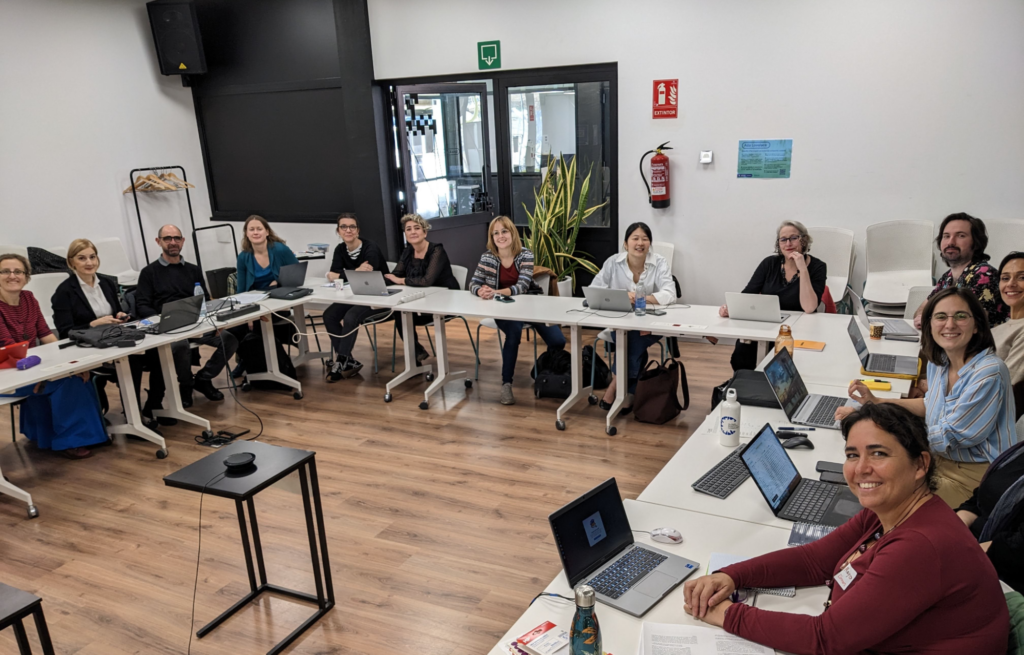
During the Core Group meeting, WG5 leader Melissa Renau Cano also presented an analysis of the composition of the network, based on a survey conducted with Action members prior to the meeting. The available responses showed a majority of participants coming from academia as well as a preponderance of expertise in labor (55,1%), followed by organization and management (34,7%), inequalities (32,7%), and feminism (26,5%, see details below).
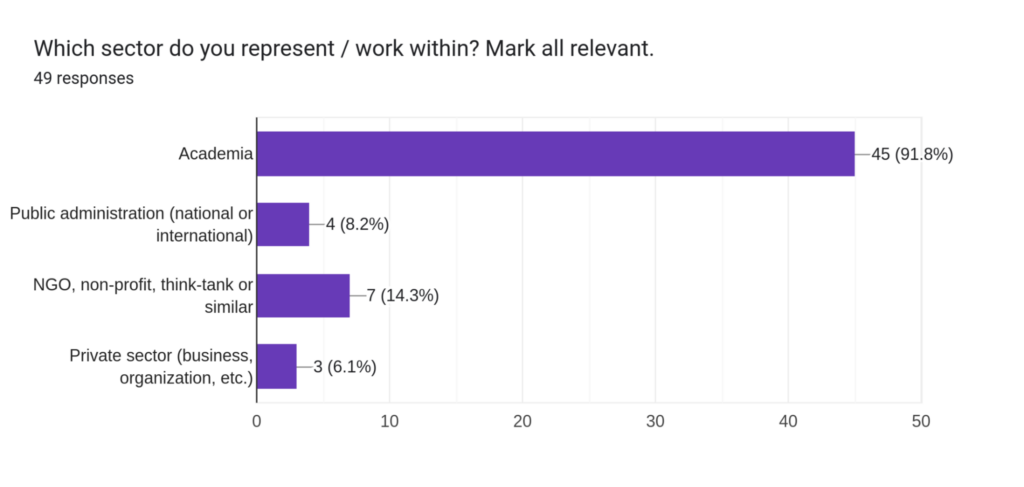
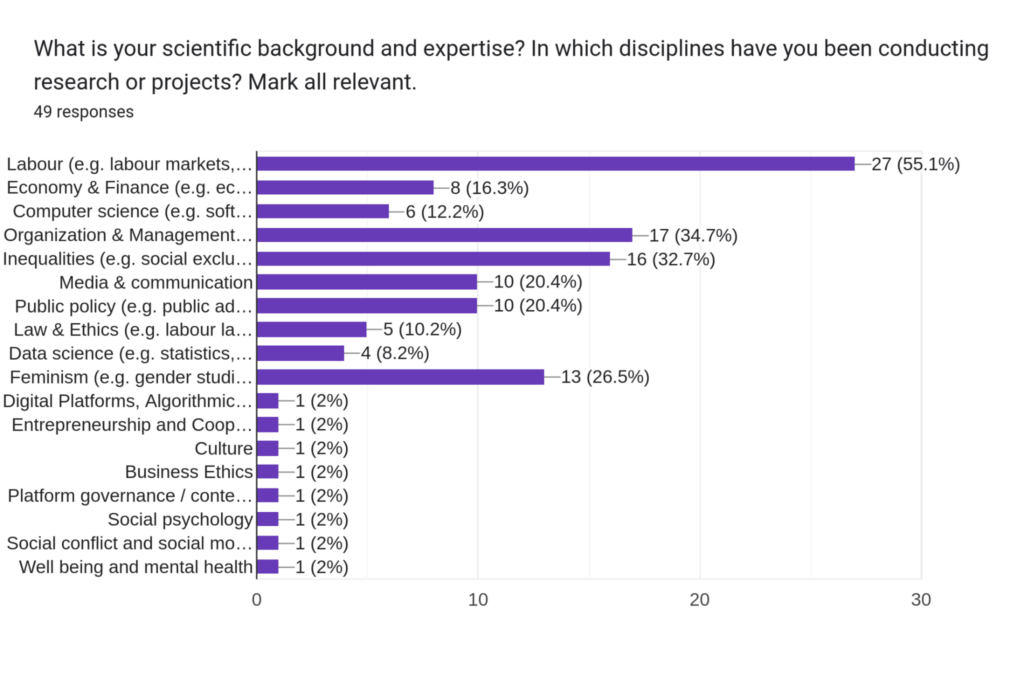
The work session concluded with a dinner at the restaurant Senyor Fabra, where Core Group and other P-WILL members already in the city could continue their conversations and further networking.
In the morning of March 15, P-WILL celebrated its first in-person MC meeting, with the participation of 33 on-site and 5 online MC members from 27 countries. Nathalie Warenghien, the Action’s Administrative Officer, represented the COST Association in the meeting.
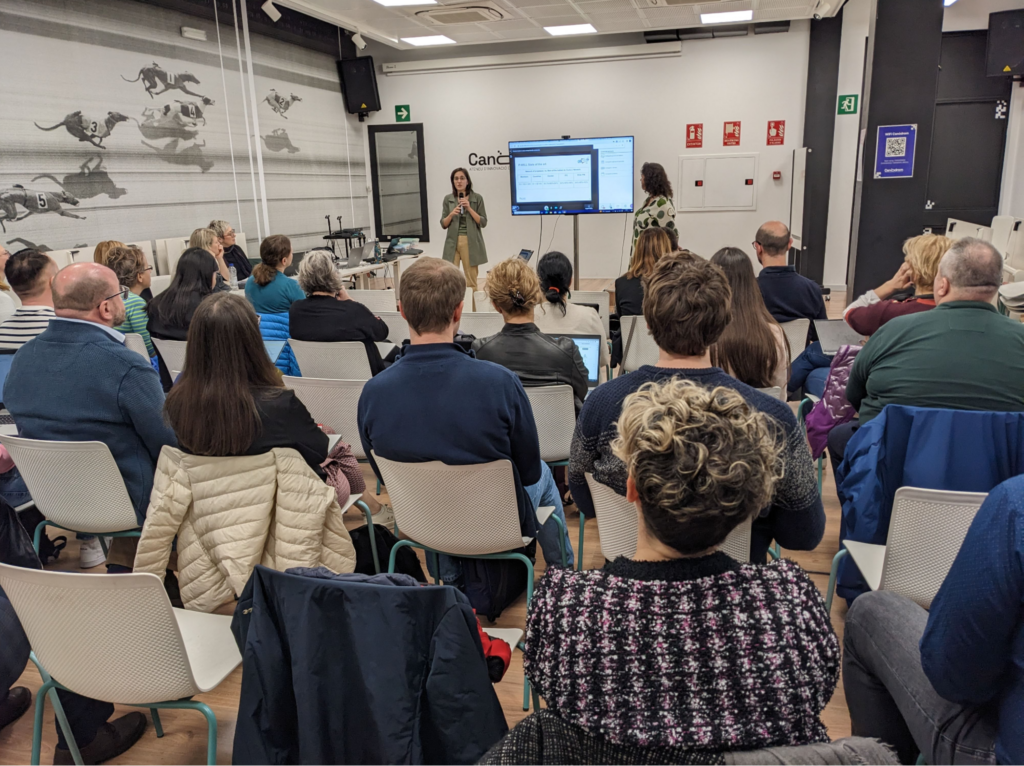
The meeting began with a review of the delegation of powers to the Core Group, a recap of the minutes of the last meeting, e-votes and matters arising in the interim, a report from the Core Group, and an update on Action (as well as WG) Membership regarding the implementation of the COST Excellent and Inclusiveness Policy. In this regard, it was highlighted that the Action, since its kickoff meeting of September 2022, has grown from 135 to 200 members, and the countries represented have increased from 39 to 43. Moreover, P-WILL has steadily improved its implementation of the COST Excellence and Inclusiveness Policy. Regarding gender parity, the Action has a 64% of women (62% at the time of the kickoff), 46% ITC (40% at the time of the kickoff), and 43% YRI (40% at the time of the kickoff).
Anna Enciso presented the budget status on behalf of the Grant Holder and Nathalie Warenghien shared important updates and guidelines regarding travel reimbursement. MC members were also briefed on the decisions of the first call for Conference and Mobility Grants by Kosjenka Dumancic, Grant Awarding & STSM Coordinator, who also announced a new call to be published after the Barcelona meeting. Science Communication Coordinator Cristina Miguel presented the Action’s social media channels on Twitter, LinkedIn, and Facebook.
During the meeting, MC members could also learn more details about the approved activities for the first grant period, which include an Inclusive Digital Economy Conference in Belgrade, dedicated sessions at the Global Perspectives on Platforms, Labor & Social Reproduction in Amsterdam, a workshop on best policy practices in paid domestic work in London, and legislative initiatives seminar in Bologna.
The afternoon of March 15 was devoted to WG meetings. The agenda included both parallel meetings of each WG and plenary sessions to address common and transversal issues. Among these, WG participants discussed sources and channels for WG coordination, the mapping of resources based on the survey, and key concepts. Within this framework, WG2 and WG3 held a workshop on alternative platforms to advance on the definition of shared criteria for case inclusion, and WG5 hosted a session on impact assessment methodology and the Communication and Publications Plan. At the end of the day, WG members gathered to share their reports about the sessions and discuss next steps. The journey ended with a dinner at the restaurant Senyor Fabra, where Action members could continue their conversations and debates in a more informal way.
On March 16, a special P-WILL site event was organized in the framework of the VIII Congress of Feminist Economy, held at the Nau Bostik, a former industrial warehouse in the outskirts of Barcelona, now repurposed as a social center and cultural experimentation space as a result of citizen mobilization.
The Congress was inaugurated by Ada Colau, Major of Barcelona, Àngels Fitó, new rector of the Universitat Oberta de Catalunya, and Amaia García Azpuru, of the organizing team of the VII Congress of Feminist Economy.
The institutional welcome was followed by a plenary session on “The current state of the economy: Debate from feminisms on new challenges and opportunities arising from the digital revolution,” presented and moderated by Astrid Agenjo-Calderón (Universidad Pablo de Olavide) and with the participation of Flora Partenio, Argentine feminist activist and member of the Network of Feminists of the Global South DAWN; Tiziana Terranova, expert on the impact of technology on society and professor at the University of Naples; Yayo Herrero, anthropologist, professor and ecofeminist activist; and Rafaela Pimentel, spokesperson for the group of domestic workers and care Territorio Doméstico.
The Congress continued with a special P-WILL panel on “Platform economy, employment and social protection,” which included the following presentations: “Towards social citizenship? An intersectional feminist analysis of domestic platform work in Paris, France (CEPASSOC project),” by MC member Claire Marzo (Paris East University); “Employment perspectives of rural women in the context of platform work,” by MC members Dina Bite and Liva Grinevica; “Intersectional feminist analysis of digital care platforms in Spain,” by WG members Paula Rodriguez Modroño, Astrid Agenjo-Calderón, and Purificación López Same (Universidad Pablo de Olavide); and “The logics around the algorithm in the sector of the riders. A perspective of gender,” by Cynthia Srnec (Sciences Po Saint-Germain-en-Laye), Nuria Soto (Universitat de Barcelona), and Raquel Alquézar Crusellas (Universitat de Girona).
This session was followed by a debate on “Intersectional feminist perspectives on platform work: Approaches from the international network P- WILL,” presented and moderated by WG member Susana Galán (Dimmons, Universitat Oberta de Catalunya), and with the participation of MC member and WG1 leader Kylie Jarrett (Maynooth University); WG2 co-leader Funda Ustek Spilda (Fairwork project, Oxford Internet Institute); and MC member Nelli Kambouri (Panteion University).
After lunch at the Nau Bostik, the Congress resumed with a second plenary on “Feminist digital economy?: Criticisms and contributions to digitalization from feminisms,” presented and moderated by P-WILL’s chair Mayo Fuster Morell (Dimmons, Universitat Oberta de Catalunya), with the participation of Alex Hache, cyberfeminist and member of Donestech; Sasha Constanza-Chock, researcher and designer with a focus on social movements in networks and justice in design processes; Joana Varon, founder and director of the feminist collective Coding Rights; Catherine D’Ignazio, director of the Data + Feminism Lab (MIT); and Paula Guerra Cáceres, anti-racist activist and member of AlgoRace. (De)racializing AI.
The sessions concluded with the roundtable “Matchimpulsa: Good practices of the Social Economy towards a feminist digitization,” organized by WG members Ricard Espelt and Núria Vega, and WG5 leader Melissa Renau (Dimmons, Universitat Oberta de Catalunya). The roundtable included, as speakers, Mireia Sanglas (Suara), Eba Inda (Fasolà), and Natalia San Juan (Femnoise), and was moderated by Álvaro Porro, from the Barcelona City Council, and Mayo Fuster Morell.
The report of the different sessions of the Congress can be found here.
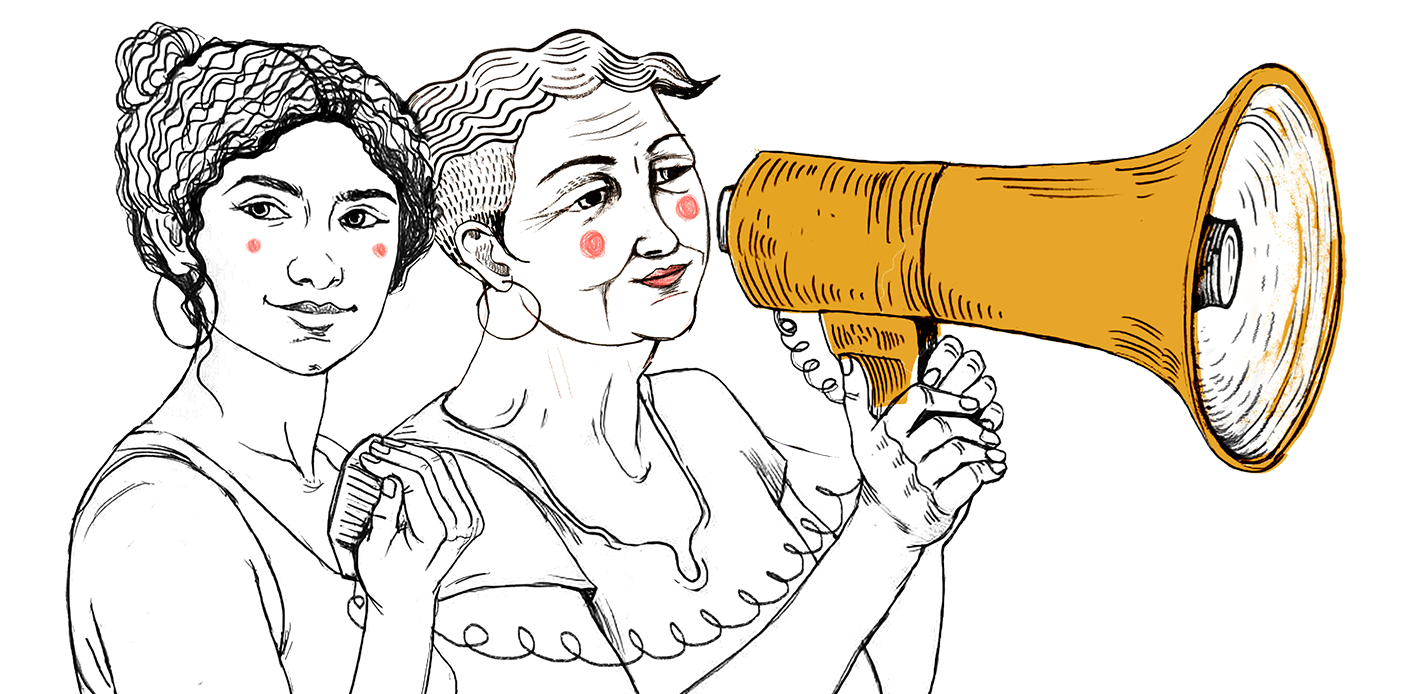
Recent Comments